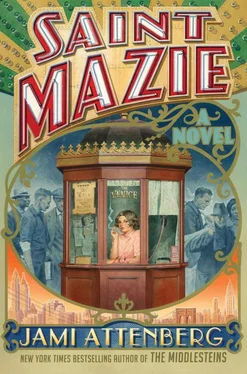I found the ledger from 1929, and it indicates there was a fund set up by Miss Phillips-Gordon in honor of her mother, Ada Phillips. The money was earmarked to help women and children. It was blind on the part of Miss Phillips-Gordon, meaning she gave the church the money, but had made a request to never know what was done with it, or rather, who was helped with it. The fund was used to establish battered women in new homes, pay for doctors’ bills for them and their children. At the time we worked in tandem with churches in Montreal and Buffalo, and so these women from New York were set up with new lives in those communities. I wouldn’t be able to tell you how many women she helped. Hundreds? Thousands? I’ve no idea. Many, many women. There was a substantial initial deposit, and then this fund was maintained annually until Miss Phillips’s death in 1964.
I don’t know what we’d do if we got a comparable donation now. Gosh, we could do so much good with it. I don’t even want to think about it, but I do, you know? What a dream it would be.
Mazie’s Diary, September 2, 1923
She’s lost her mind. Tore the room apart looking for the envelopes. Bed up, sheets off, curtains down. Rug on sidewalk. I think she threw it out the window, but can’t be sure.
George Flicker
There was some bad blood between Mazie and Rosie for a while but no one knew why.
Mazie’s Diary, September 3, 1923
A screaming match at the cage. She was trying to claw me at the window. I didn’t even recognize her at first. The eyes confused me. The cruelty of her gaze. Then her hands were up against the cage, trying to shake it, shake me out of there. No blood of mine, is what I was thinking. She’s not my sister.
She said: Where is it?
I said: It’s gone and that’s all you need to know.
Rosie said: Give it to me. I need it.
I said: You’re being a fool, Rosie.
She said: You don’t know anything about anything.
Rudy came running and held her back as best he could with those tiny hands of his. She shook him off and ran.
Mazie’s Diary, September 4, 1923
Tee said: Wait it out. It’s all you can do.
What I want to say to Rosie is that I know her pain is like no other, but also that it is no worse or better than anyone else’s. We do not get to suffer forever.
Mazie’s Diary, October 1, 1923
She’s out there somewhere. I stopped by the Bayard Street building to collect this month’s rent, and the tenants said she’d been there already and taken their money. Likely handed it straight to the gypsies.
Mazie’s Diary, November 1, 1923
Happy Birthday to me. Twenty-six years old and my life’s chaos.
Sister Tee brought me some daisies, and later I threw one back with Mack. I haven’t forgiven him one thing. But I was lonely. Surrounded by people all day long yet as lonely as can be.
Mazie’s Diary, November 2, 1923
The rent’s gone again, in her pocket, in their pockets.
Mazie’s Diary, November 5, 1923
Saw her on the street, grabbed at her arm, and she ran. I chased her, chased her through Chinatown, we ran and ran.
I said: Please, Rosie, please.
I said: Please come home.
I said: Please, I love you.
I lost her on Canal Street.
I don’t even know if it really happened or if it was just a dream I had this morning. Or if it was even her, even Rosie at all.
Mazie’s Diary, December 4, 1923
Rosie’s home. I found her last night on the couch. Thin and gray and snoring. I just covered her with a quilt a moment ago. I was afraid to touch her, I thought she might disappear.
I’ll forgive her anything if only she’ll forgive herself too.
Elio Ferrante
The thing about these gypsies is eventually they leave. There’s no long con in their world. Get in and get out. Change your look, and hit the road.
Mazie’s Diary, January 3, 1924
I found her in the ocean last night. The door was open when I came home from work. I walked the street calling her name like she was a lost dog. Then I saw her standing in the ocean, nearly waist high in it. Not close enough to drowning herself. I write this so that it will be true. That she does not want to drown herself.
The moonlight was all around her. The ghost of my sister. I waded my way in, pulled her back toward the sand. We stumbled a bit. The surf crashing around our ankles, both of us shivering. She was white and blue at the same time. I threw my whole self around her to warm her but she shook me off.
She said: It’s been a hard year, Mazie.
I said: I know.
She said: It’s been a hard life. Thirty-four, and I’ve nothing to show for it. A dead husband. No baby. What do I have left?
I said: You have me. I’m here. I’ll never leave you.
I’m not going to leave her. It’s not a lie.
I said: Come on, Rosie, it’s cold as a witch’s tit out here. You’ll catch your death. And if you die, I’ll murder you. I’ll do it with my own two hands.
I wanted her to be beautiful in the moonlight — everyone looks beautiful in the moonlight — but all of Rosie’s collapsed now. Been falling apart for years, Rosie has. More of her hair is gray now than not. It flew all about her, nearly purple in the moonlight. The lines around her eyes and lips jagged and deep in her skin. The chin, sunken and wobbling. Once it falls like that it never rises again. Those are the rules of life. Only the pale cream color of her skin remains. That reminds me of young Rosie.
Slow steps to the grave. I won’t be the one to bury her though.
I said: I’ll kill you if you die.
I put my arms around her throat. It was and wasn’t a joke. We just stood there like fools, our teeth clacking, our lips turning blue, two corpses in the ocean, only one of us more alive than the other.
Finally she fell on me, and held me for warmth. I don’t know if it was her body or mind that gave in first. I will take what I can get from her.
I said: At least you had a love.
Then we both started crying. I wept into my brokenhearted sister, and she wept into heartless me.
Mazie’s Diary, April 2, 1924
Postcard from the Captain. Niagara Falls. A place not so far away from New York City. A day trip, a train ride away. I can see it on a map in my head.
I read the back of it once and that was enough. But I liked the picture, so I put it up on my wall. I can hear the crash of the waves when I look at it. I can feel the spit from the falls on my face. I bet it’s cold up there near the water. I bet the air stings your skin red. Like a man slapped you hard and meant to leave a mark.
Mazie’s Diary, April 15, 1924
We’ll move again, is what I decided. Back to the city, where I can keep a better eye on her between work and home.
She said: But I can’t go through his things.
I said: We’ll leave them then. We don’t need any of it.
She said: This house is a mess.
I said: Leave it. Let the next person worry about it.
She said: Where will we live?
I said: Anywhere we want.
Finally I convinced her to agree to the move. Agree to living, that’s the most I’m asking from her right now.
Part Three. Knickerbocker Village
7. Excerpt from the unpublished autobiography of Mazie Phillips-Gordon
I think of all the misfortunes I’ve had through the years, but none of them landed me on the street — not unless I chose to walk it myself.
Pete Sorensen, owner, Diary of Mazie Phillips, Red Hook, Brooklyn
Читать дальше












